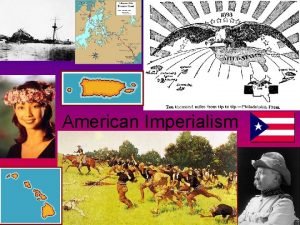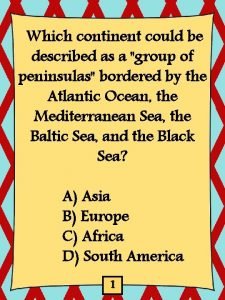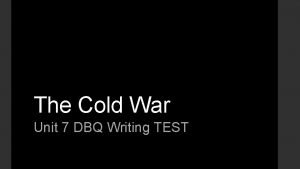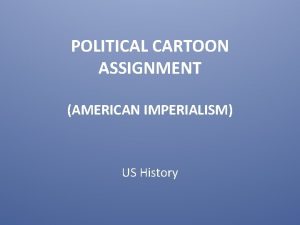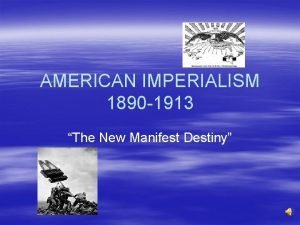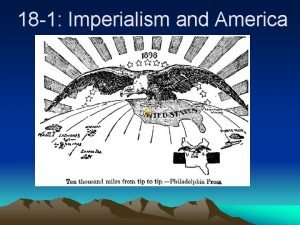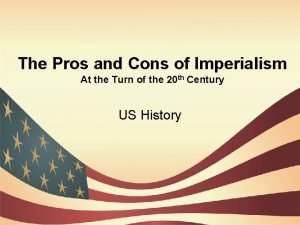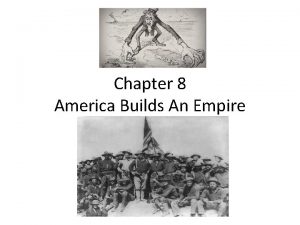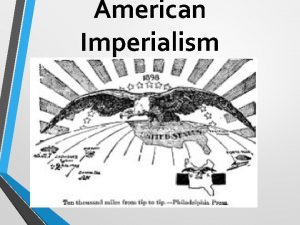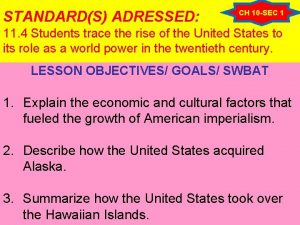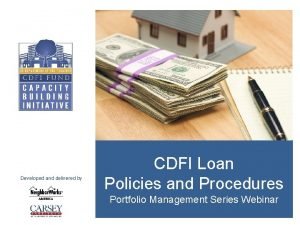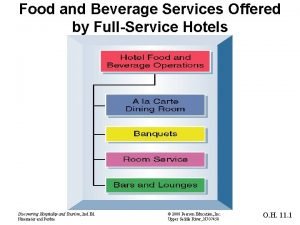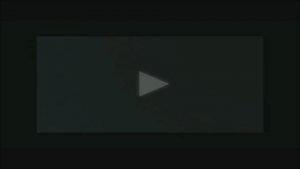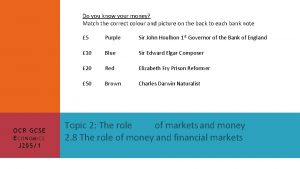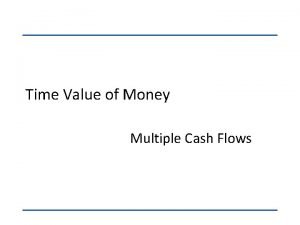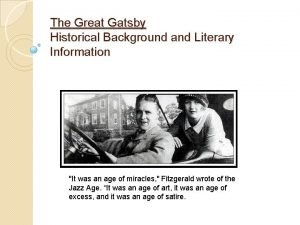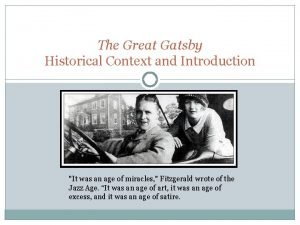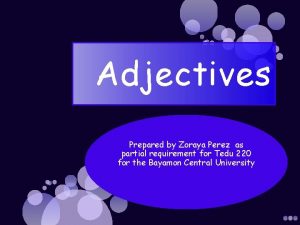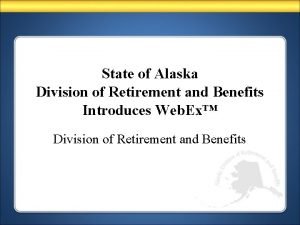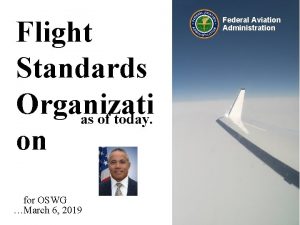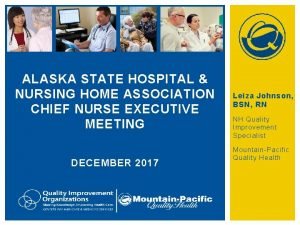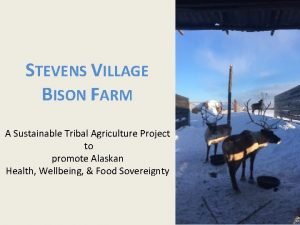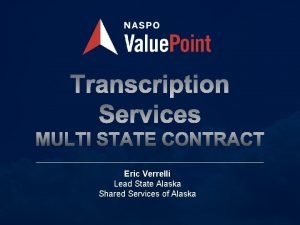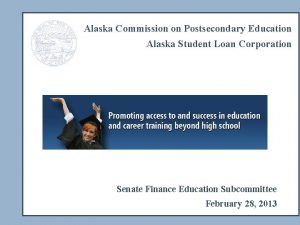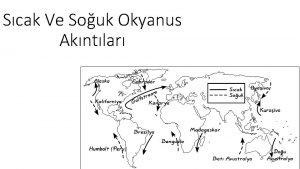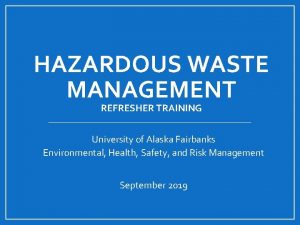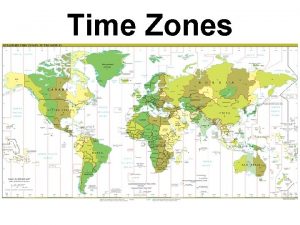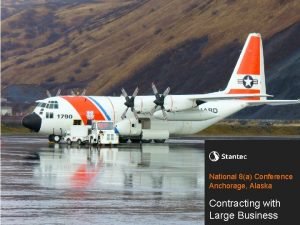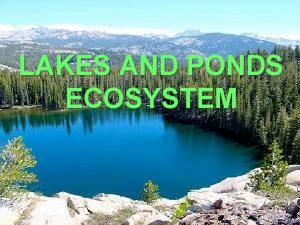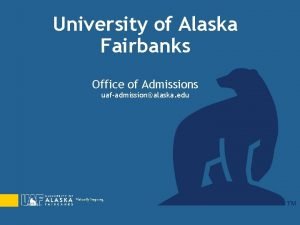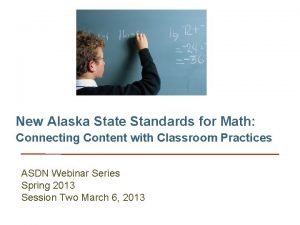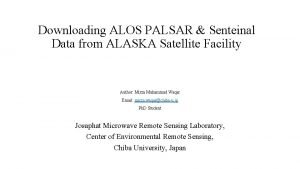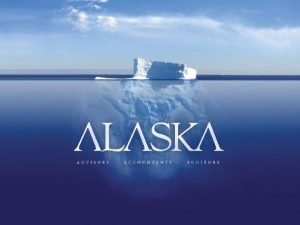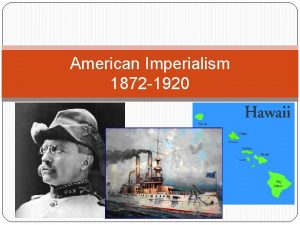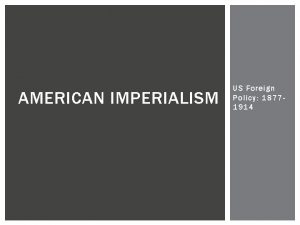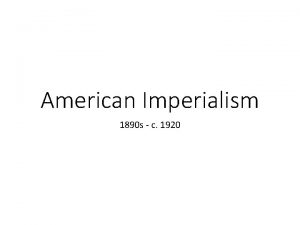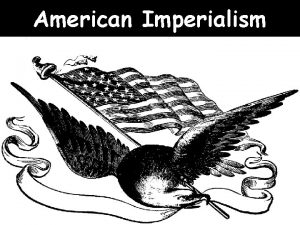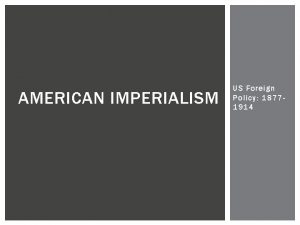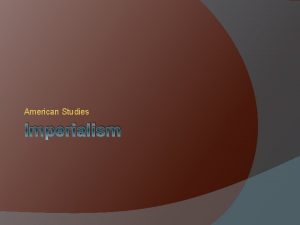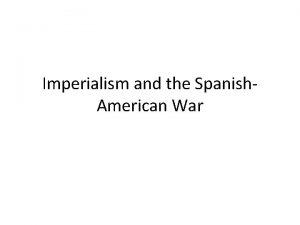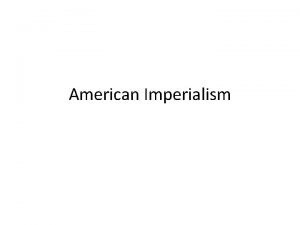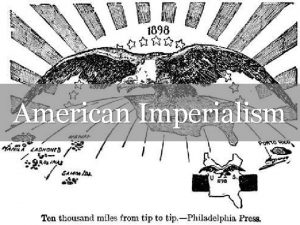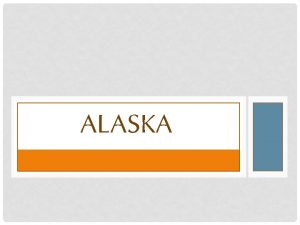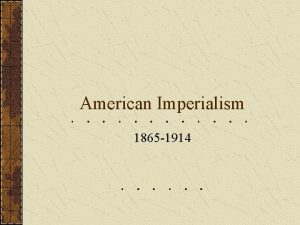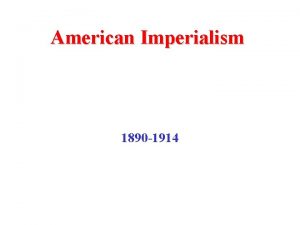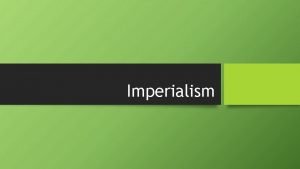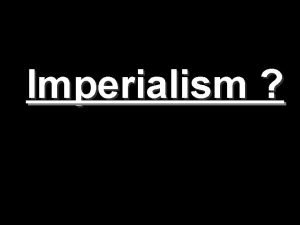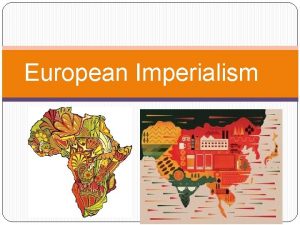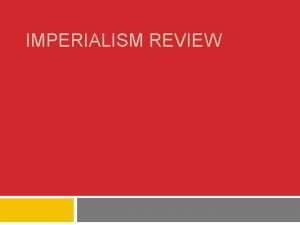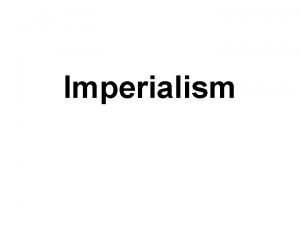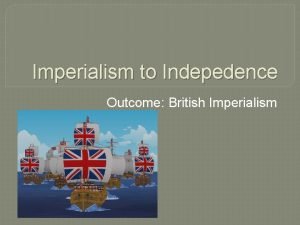American Imperialism Alaska Russia needed money US offered














































- Slides: 46

American Imperialism

Alaska • Russia needed money. US offered to buy Alaska in 1867. • We hoped that we could use it as a base for trading with Asia and to encroach on Canada. • Alaska bought for $7. 2 million. • “Seward’s Folly” • Gold, oil, resources.

Opening Up Japan • Americans want to sell goods to Japan. • Matthew Perry, an American commodore (admiral) sails to Japan in 1854. • His mission is to end Japanese isolation and get Japan to trade with America. • Japan will sign the Treaty of Kanagawa which will open up two ports for the Americans to trade from. • It also allows an American embassy to be built in Tokyo. • Soon, Japan will allow European nations to trade with it as well and end 200 years of isolation.

What is Imperialism? • The industrialized nations of Europe and the US, hungry for resources, seek out colonies in Asia, Africa, and the Pacific to exploit them. • They dominate the political, economic, and social lives of the countries that they take over (whether by peace or by force). • The colonies are exploited as markets for manufactured goods as well as to drain the resources they have.

“White Man’s Burden” • Social Darwinism: A social sciences version of the Theory of Evolution. In it, those people or societies that were best fit to succeed and be wealthy would achieve that. Those people who are poor or those societies that are not advanced, are held down because they are “weaker” than the others. • “White Man’s Burden”: A poem by Kipling, in reference to the United States acquiring the Philippine Islands. The poem stresses that it “is the white man’s burden” to bring civilization to the “uncivilized” world. The poem is since been debated because is Kipling saying that we need to civilize Africa and Asia or is he criticizing the view that we are doing this.

European Imperialism in Africa • Berlin Conference of 1884 -1885 divides up Africa between the European powers. • France and Britain take the most land. • Only Liberia and Ethiopia are spared conquest.

European Imperialism in Asia • Britain controls India, France controls Indochina, and the Dutch control many islands. • Japan is a growing industrial nation in Asia and seeks to control the region. • Russia also wants to dominate.

China’s Open Door • Policy created by Sec. of State John Hay. • The policy states that the Europeans will not carve China into colonies. • Also, the spheres of influence will not be closed off to merchants of other nations. • Instead, China will be an “open door” for everyone. • It keeps American trading interests in China and keeps China independent. • It also helps prevent a war from breaking out of Chinese territory amongst European rivals.

Boxer Rebellion • A secret Chinese nationalist group called the Society of Harmonious Fists becomes angry at the special treatment given to Chinese Christians and are upset at the growing influence of the Europeans. • In the spring of 1900, the rise up in Beijing shouting “Death to the foreign devils!” • In August, 20, 000 foreign troops (Britain, Germany, US, France, Austria, Italy, Russia, and Japan) fight and crush the uprising. • The rebellion showed the growing Chinese nationalism, but still, the European powers remained in control of China.

Queston Time • 1. Define “white man’s burden”. How do you feel about this? • 2. Why did the Europeans and Americans seek to dominate other lands? • 3. Do you think that the Open Door policy helped or hurt China? Why?

America’s Interests Abroad • US wants to make money. • US wants to open up markets to other nations to sell goods. • US also wants to get coal “stations” to refuel commercial and military ships. • Can’t expand locally.

Jingoism • Mc. Kinley was reluctant to go to war and hoped for peace • Many Republicans (including a young Theodore Roosevelt) grew angry with Mc. Kinley’s reluctance for war; they believed in a form of nationalism called “jingoism” – a blind willingness to use force against other nations to protect the best interests of the US • Mc. Kinley caved to the pressure in April 1898 and asked Congress to authorize the use of force against Spain

Frederick Jackson Turner • 1861 – 1932 • Historian / Professor • 1893: Proposed his “Frontier Thesis” which argued that American society had evolved as a result of always having a Western frontier; now that the frontier was closed, US was at risk of stagnation • Many interpreted this as meaning that the US needed to find new frontiers in order to maintain our position

Alfred Mahan • Admiral in the US Navy. • Believes that the US needs to build a great navy so that it can compete in the industrial world. • With a big navy, we can protect our borders as well as exert our influence elsewhere (like Britain). • His book, The Influence of Seapower Upon History, 1660 -1783, influences world leaders like Kaiser Wilhelm II and Ass. Sec. of Navy Theodore Roosevelt.

Hawaii • Island chain in the middle of the Pacific Ocean. • Great natural harbor at Oahu. • Desired by France, Britain, and US (see flag) as a coal refueling station. • Great climate for growing pineapple and sugar cane.

Hawaii • American planters who lived in Hawaii wanted to compete with American sugar in Louisiana. • Led by Sanford Dole, they overthrew Queen Liliuokalani in 1893 and demanded to be annexed to the US. • President Cleveland responded by recognizing the new republic, but wouldn’t annex the islands unless a majority of Hawaiians support it. • In 1898, President Mc. Kinley annexed the islands.

Question Time • 4. Why did we take over Hawaii? • 5. Many people, including President Cleveland, felt that our handling of Hawaii was wrong. How do you feel? • 6. Overall, what is our overseas interests? • 7. Do you think we are still “jingoist” today? How?

Cuban Problems • 90 miles off the coast of Florida. • Has several rebellions against the Spanish. • The US supported Cuban independence or, at least, better treatment of the Cubans by the Spanish. • De. Lome Letter of 1897: Written by the Spanish ambassador. Calls Mc. Kinley “weak”. De. Lome resigns after the uproar in America. • Veleriano Weyler is sent by Spain to crack down on the rebels.

American Interests in Cuba • Cheap Sugar. (no tariffs) • Lots of American business in Cuba. • Potential naval bases to protect potential Central American canal. • Several times, we tried to buy Cuba from Spain. • Identify with their struggle for independence.

Yellow Journalism There will be no war. — Frederick Remington You furnish the pictures and I'll furnish the war --Hearst • Part of a newspaper feud between William Randolph Hearst’s New York Journal and Joseph Pulitzer’s New York World. • They would fabricate or sensationalize stories to make them more exciting so they could sell more papers. • Yellow journalism appealed to people’s emotions.


The Maine Incident • Sent to Havana, Cuba to protect American businesses. • On Feb. 16, 1898, the ship mysteriously blew up in Havana harbor. • Recent historians believe a coal fire destroyed the ship. • Spanish agents were blamed. • Remember the Maine! • US declares war on April 11.

Yellow Journalism

Spanish-American War • Teller Amendment: Said US would free Cuba and not take it over. • The day that Congress voted on war, Ass. Sec. of Navy, Theodore Roosevelt, dispatched the Pacific Fleet from Hong Kong to go to Manila. • Spain had control of the Philippines. The islands were also in rebellion.

Spanish-American War • First shots in the war were at Manila Bay on May 1, 1898. • Adm. George Dewey loses one man as he, and his 5 ship fleet, destroys all 7 Spanish ships. • The victory enables the Americans to capture Manila that summer. • US controls the Philippines.

Spanish-American War • In late June, the US lands soldiers near Santiago de Cuba. • Theodore Roosevelt resigned from the government and raised his own cavalry regiment he called the Rough Riders. • At the Battle of San Juan hill, the Rough Riders, along with the 10 th Cavalry, and 24 th and 25 th Infantry win a decisive victory.

Spanish-American War • In Cuba, the Spanish fleet was trapped at Santiago de Cuba. • When they are ordered to fight, the fleet is destroyed on July 3. • Cuba is totally under US control.

Treaty of Paris 1898 • • Ended the “Splendid Little War” Signed in Dec. 10, 1898. Cuba becomes independent. Spain will give the US Puerto Rico, Guam, and the Philippines. • US will give Spain $20 million for Spain’s losses.

Effects of the Spanish American War • Cuba is free, but with the Platt Amendment, we get to interfere whenever we want to in Cuban affairs. • A 10 year long war in the Philippines will begin between the US and Filipino rebels. • US is being seen as a major world power. • Teddy Roosevelt is now a national figure. NY Governor in 1898 and US VP in 1900. • Had to fight yellow fever and malaria in tropical lands. • US got the rights to naval base at Guantanamo Bay.

Samoa • US, Britain, and Germany all wanted Samoa as a refueling station for ships. • Germany and US get control of Samoa in 1898. • Samoa has been a territory of the US ever since.



Question Time • 8. Why did we go to war with Spain? • 9. How do you feel about what we did to the Filipinos considering we fought Spain for the same reason? • 10. Even though we set Cuba free, how did they become part of our “empire”?

Russo-Japanese War • In 1903, Japan and Russia went to war over domination of Manchuria in Northeast China. • Japan offered to recognize Russian rights in Manchuria if Russia stayed out of Korea. • Russia refused and war began. A modernized Japan defeated Russia in almost every battle. • The Japanese defeat the Russians in a siege for Port Arthur. The Japanese seal the war with a humiliating victory at the Battle of Tsushima Strait where the smaller, modernized Japanese fleet destroys the older, larger Russian Baltic Fleet. • The war is the first war in which an Asian nation defeats a European one. It also solidifies Japan as an emerging, powerful nation in Asian affairs. • Teddy Roosevelt negotiates the peace treaty and wins the Nobel Peace Prize in 1906.

Roosevelt Corollary Speak softly and carry a big stick; you will go far. — African proverb • Addition to the Monroe Doctrine. • Europe is not allowed to interfere in the affairs of the Americas. • The US is allowed to interfere to protect its “interests” • Latin American disorder would make the US an “international policeman.

Dollar Diplomacy • President Taft tries to further US foreign policy aims in Latin America through use of economic power by guaranteeing loans made to foreign countries. • Taft would send troops to South and Central America to help collect foreign debts.

Roosevelt Corollary and Dollar Diplomacy in Action • • • Haiti: 1914, 1915 -1934 Honduras: 1903, 1907, 1911, 1912, 1919, 1924 -1925 Mexico: 1913, 1914 -1917, 1918 -1919 Cuba: 1906 -1909, 1912, 1917 -1922, 1933 Dominican Republic: 1903 -1904, 1916 -1924 Panama: 1903 -1914, 1918 -1920, 1921, 1925 Nicaragua: 1910, 1915 -1925 Columbia: 1901 -1902, 1926 -1933 Venezuela: 1901 Guatemala: 1920

Panama Canal • For years, sailors would have to sail for months around South America to get from NY to California/ Atlantic to Pacific. • French tried to build a canal in the late 1800’s, but couldn’t because of malaria. • Hay-Pauncefote Treaty—Britain recognized US rights to build canal. • Two routes, Nicaragua or Panama. • Colombia owned Panama.

Panama Canal • United States offered Columbia a renewable 99 -year lease on a 6 -mile wide strip across Panama for $10 million and an annual payment of $250, 000. • Columbia refused and wanted more money. • Roosevelt was really upset and took advantage of Panamanian politics. • He sent a US warship off the coast of Panama with 300 marines while Panamanians rebelled. • Roosevelt recognized Panama as an independent nation. • Roosevelt gives Panama same offer as Colombia and Panama accepts. I took the Canal Zone and let Congress debate; and while the debate goes on, the canal does also. -Roosevelt

Great White Fleet • Roosevelt wanted to show the world that the US is a great power. • He commissioned the construction of a new battleship fleet to rival anybody in the world. • In 1907, he sent the US navy on a 2 year tour of the world. • It was a tour of goodwill, but demonstrated our strength to Japan, Britain, and Germany.

Problems With Mexico • Lasted from 1910 to 1920, Mexico is gripped by Revolution. • Over 500, 000 Mexicans will lose their lives in the war. • Pancho Villa starts a guerilla campaign in Mexico and even makes a few raids into Texas, New Mexico, and Arizona. • He was viewed as a Mexican Robin Hood as he would raid the big ranches and give the food and livestock to his followers and local villagers. • He was immensely popular with the poor in Mexico. • The US sent Gen. Jack Pershing into Mexico to pursue Villa, but he always escapes.

Virgin Islands • Owned by Denmark and Great Britain. • In 1917, we buy the Danish half for $25 million. • We bought them for fear of German invasion in WWI.

US Imperialism • • • Pros Got lands Got resources Showed we are a power Getting respect Help spread democracy and civilization Is this Christian? Cons • Betraying our principals • Are we oppressors too? • Is this Christian?


Good Neighbor Policy • Started in 1933 by President Franklin Roosevelt. • US would shift away from military intervention in Latin America. • Goal was to help soothe bad feelings towards the US.

Question Time • 11. How did Teddy Roosevelt treat Latin America when he was president? • 12. How was the Panama Canal built? • 13. How would the Roosevelt Corollary and Dollar Diplomacy make our neighbors hate us? • 14. How did Franklin Roosevelt treat Latin America when he was president? • 15. Do you think America has its international policies 100 years later? Why or why not?
 Alaska american imperialism
Alaska american imperialism Money money money team
Money money money team What divides european russia from asian russia
What divides european russia from asian russia Old imperialism vs. new imperialism
Old imperialism vs. new imperialism New imperialism motives
New imperialism motives Who was nicholas novikov? when did he write this telegram
Who was nicholas novikov? when did he write this telegram American imperialism political cartoons explained
American imperialism political cartoons explained Roots of american imperialism
Roots of american imperialism Describe the cartoon
Describe the cartoon American imperialism definition
American imperialism definition The roots of american imperialism economic roots
The roots of american imperialism economic roots Pros and cons of imperialism
Pros and cons of imperialism Chapter 8 america builds an empire
Chapter 8 america builds an empire American imperialism 1800s
American imperialism 1800s What 3 factors spurred american imperialism
What 3 factors spurred american imperialism What three factors spurred american imperialism
What three factors spurred american imperialism What is
What is Loan examples
Loan examples Lifebuoy product life cycle
Lifebuoy product life cycle What is financial institutions
What is financial institutions Service offered in hotel
Service offered in hotel Plmar
Plmar Money smart money match
Money smart money match Money on money multiple
Money on money multiple Context of the great gatsby
Context of the great gatsby Symbolism in great gatsby
Symbolism in great gatsby Tom buchanan character traits
Tom buchanan character traits Hawaii proper adjective
Hawaii proper adjective State of alaska division of retirement and benefits
State of alaska division of retirement and benefits Rick domingo
Rick domingo Alaska state hospital and nursing home association
Alaska state hospital and nursing home association Dental school in alaska
Dental school in alaska Va hospitals in alaska
Va hospitals in alaska Stevens village bison farm
Stevens village bison farm Shared services alaska
Shared services alaska Alaska student loan
Alaska student loan Kuroşivo
Kuroşivo Alaska hazmat training
Alaska hazmat training Alaska time zone
Alaska time zone 8a conference
8a conference Littoral limnetic
Littoral limnetic Alaska purchased from canada
Alaska purchased from canada Admissions uaf
Admissions uaf Alaska state standards math
Alaska state standards math Ati
Ati Alos vertex
Alos vertex Alaska boekhouding
Alaska boekhouding
